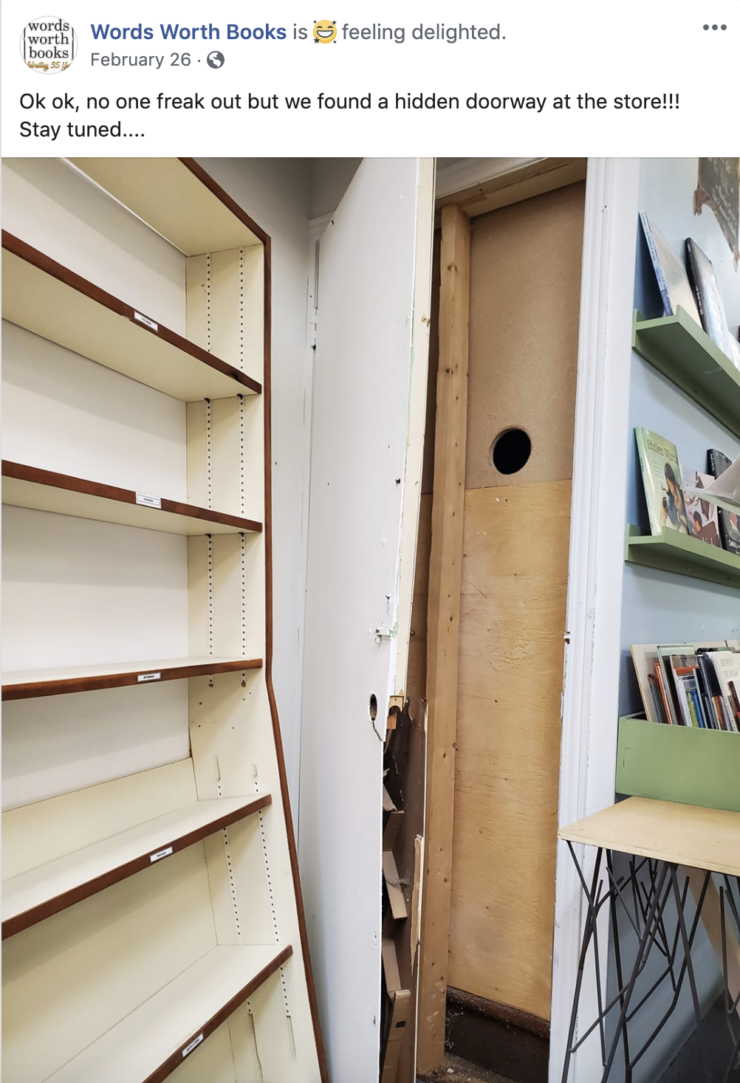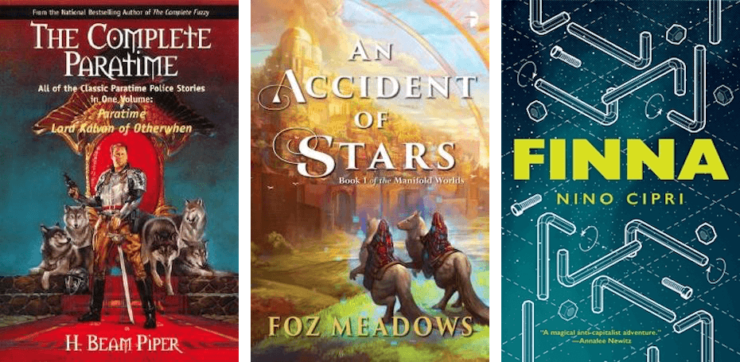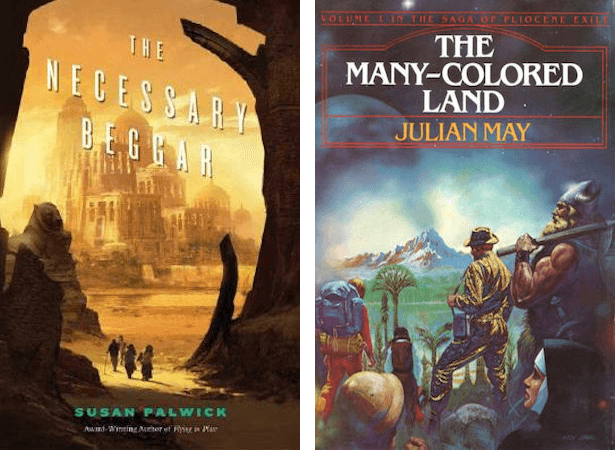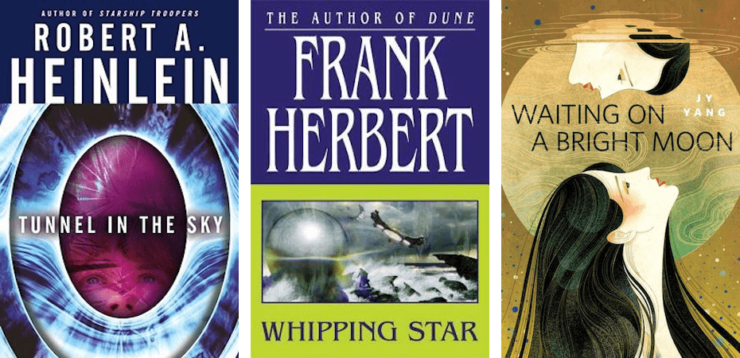Local bookstore and cultural icon Words Worth Books were in the midst of renovations when they were surprised to discover a door—a door no one had known was there! Now, the bookstore has been at 96 King Street South, Waterloo for more than thirty-five years, which makes one wonder when and how this door was constructed (or arrived)1.
As anyone who reads science fiction and fantasy can tell you, life is full of doors like that: appearing unexpectedly, leading to unexpected places. Other worlds, other times. Narnia. An alien planet. The Bronze Age.
Imagine finding the door into Sumer.

Andre Norton understood the potential in doorways. A door could lead you from post-War Europe to the Witchworld, from a world where one is but an unwanted double to one where one can be a savior, from the world we know to ones where history played out very, very differently. In fact, portals and doorways are so common (see Judith Tarr’s ongoing Norton Reread series) that it’s odd none of her interstellar empires ever seemed to make use of them.2
Portals tend to fall into two basic varieties: the ones where the traveller has some idea what is on the other side and the ones where they do not. Trips through them likewise fall into two basic categories—voluntary and involuntary. Here are some examples of science fiction and fantasy stories that feature different types of portals and passages…
Unknown Destination/Voluntary Passages

Why would someone willingly step through a mysterious portal without some idea of what lies on the other side? (Some might say that’s Narnia your business.) Either there’s something chasing the traveller that makes a blind leap seem like a sensible risk, or the call of the unknown is irresistible.
In Jo Clayton’s novel Skeen’s Leap, Skeen has found herself in quite the pickle. She’s been marooned by lover Tibo on Kildun Aalda. It’s just a matter of time before Skeen’s colorful past catches up with her and she ends up in prison or dead. A blind leap through an ancient alien portal is risky, but risk is better than her certain fate on Kildun Aalda.
Carter Horton, protagonist of Clifford D. Simak’s Shakespeare’s Planet, travels to the eponymous planet the hard way, through sublight travel combined with cold sleep. He wakes in a time in which interspace “tunnels” (a portal network linking much of galaxy) offer a faster alternative. Too bad that the mysterious builders did not see fit to leave a directory or even an FAQ for the tunnel system. Brave pilgrims like the alien Carnivore and the human Elayne are methodically mapping the tunnel network on foot. The world on which Horton wakes is an oddity: a tunnel leads into it, but egress is barred. Why? Well, that would be telling…
In Alix E. Harrow’s remarkable debut novel, The Ten Thousand Doors of January, January Scaller owes her comfortable childhood to her father’s wealthy employer, Locke. When January’s father dies in a foreign land while on one of Locke’s errands, Locke assures the young girl that he will serve as her guardian. Then the bookish girl stumbles over certain texts Locke should have locked up. January begins to suspect that she has abilities valuable to Locke and that far from being a beloved ward, she is merely a treasured possession. But there are doors that can offer someone like January an escape from her kindly jailor.
Unknown Destination/Involuntary Passages

Even if one has no intention of stepping through a portal, circumstance may nevertheless send you through one. Take diplomat Benjamin Bathurst, protagonist of H. Beam Piper’s short story “He Walked Around the Horses.” Bathurst had no idea it was possible to step from one world to another until he managed the trick. Unfortunately for Bathurst, the world he finds himself in is a dangerous one, and he has no idea how to return home…
In Foz Meadows’ An Accident of Stars, Saffron Coulter didn’t choose to wander through an interdimensional hole. Too bad it’s a one-way trip. Goodbye to all her friends and family! Worse yet, she is trapped in Kena, a fantasy kingdom on the brink of civil war. Saffron may not have to miss her loved ones for long.
Nino Cipri’s Finna offers a compelling reason for venturing through a hole in reality to face god knows what dangers: it’s to keep the stockholders happy. IKEA-esque furniture chain LitenVärld has a problem: portals randomly appear in their big box stores—holes in reality that send valuable patrons to alien worlds. No worries! LitenVärld is well supplied with poorly paid employees who will obey orders to follow the missing customers down the rabbit hole. They are to rescue their unfortunate customers, find reasonable replacements, or die trying.
Known Destination/Involuntary Passages

Gateways and portals are not merely doorways to adventure. There’s no oubliette as convenient as a rift in time or space down which one can dispose of unwanted enemies, rivals, oppressed minorities, or just the unlucky.
In Susan Palwick’s Necessary Beggar, the city of Lémabantunk sends convicted murderer Darotti and his entire family through a one-way gateway to another universe, to an alien nation calling itself America. It’s the end of the matter as far as Lémabantunk is concerned. For Darotti’s family—father Timbor, sister Zamatryna, brother Macsofo and the others—it is the beginning of a painful struggle to find a niche in a nation implacably hostile to newcomers.
In Julian May’s The Many-Colored Land, Earth and indeed the whole Milky Way are firmly controlled by the Galactic Milieu. A one-way time gate back to the Pliocene offers escape from conformity. Exiles are sterilized and forbidden to export high technology; the Milieu has no desire to see its history rewritten. As the Pliocene Exiles discover, Earth’s pre-history is far more poorly documented than the Milieu knows. No bucolic paradise waits. Instead, the exiles find alien slavers and a brutal civil war.
Known Destination/Voluntary Passages
 A portal that will take you somewhere known has clear utility, particularly if that somewhere is pleasant. Even better if said portal will let you return. No need to worry about roads or rockets when convenient doorways are at hand.3 If the portals work according to spec, that is….
A portal that will take you somewhere known has clear utility, particularly if that somewhere is pleasant. Even better if said portal will let you return. No need to worry about roads or rockets when convenient doorways are at hand.3 If the portals work according to spec, that is….
Interstellar gates provided the Earth of Robert A. Heinlein’s Tunnel in the Sky with an escape from Malthusian doom.4 They also provide a plucky teen like Rod Walker with the chance to test his survival training against an authentic alien world. The plan is a brief sojourn, after which the surviving students can return to their family. The reality proves quite different. The return gate fails to appear on schedule, forcing the kids to find some way to survive on an alien world or die trying.
The Caliban Jumpdoors featured in Frank Herbert’s Whipping Star are not an escape from demographic doom. They are merely enormously convenient, permitting the denizens of the ConSentiency to step from one world to another without all the bother of starships. It falls to Bureau of Sabotage agent Jorj X. McKie to discover that jumpdoors have an undocumented feature: if the Caliban controlling a jumpdoor dies, every being who ever stepped through that door will die. That’s bad enough. But there’s more: every jumpdoor in existence is controlled by a Caliban called Fannie Mae; virtually every adult in the ConSentiency has used a jumpdoor at least once; now someone is doing their very best to kill the Caliban.
The Imperial Authority controls the teleport network in JY Neon Yang’s Waiting on a Bright Moon. The Authority does its best to control everything. It’s inconvenient that the ansibles crucial to the network are living people like Ansible Xin. The Authority chooses to rule them by fear: transgression is punished harshly. Even suspected transgression is punished harshly; innocence is no protection. Xin is suspected and realizes that she has nothing to lose by throwing her lot in with the rebels.5
I have probably forgotten to mention some relevant novel or short story that you hold dear. You can tell me about it in comments below…
In the words of Wikipedia editor TexasAndroid, prolific book reviewer and perennial Darwin Award nominee James Davis Nicoll is of “questionable notability.” His work has appeared in Publishers Weekly and Romantic Times as well as on his own websites, James Nicoll Reviews and Young People Read Old SFF (where he is assisted by editor Karen Lofstrom and web person Adrienne L. Travis). He was a finalist for the 2019 Best Fan Writer Hugo Award and is surprisingly flammable.
[1]The door led to a stairway. A mysterrrrrrriious stairway. To a less mysterious accounting office on the second floor of the building. You may ask how, if the stairway was blocked up for decades, the people in the accounting office entered and exited. Good question! But I am out of room in this foot note.
[2]C. J. Cherryh’s Morgaine books offer a sensible explanation: the side effects of using gates is so terrible that even hubristic technophiles like the Unionists aren’t foolish enough to use them.
[3]If one were a table-top roleplaying game company, portals would offer a way to sidestep the infamous Mapping Problem as far as interstellar RPGs are concerned. Thus Chaosium’s “FutureWorld” (reviewed here: https://jamesdavisnicoll.com/review/hand-full-of-stars), which crammed a whole SFRPG into sixteen pages in large part through the use of conveniently constrained gates.
[4]I joke! Given Heinlein’s assumptions about human birthrates, doom can be delayed but not prevented. The gates may have given humans one hundred thousand times as much territory into which to expand, but at baby boom birthrates, it should only take four or five centuries for all one hundred thousand worlds to be as densely populated as Earth.
[5]The author may have been thinking of a well-known episode in Chinese history in which soldiers who would be killed for being late to their posts (even if the delay weren’t their fault) decided that they might as well rebel: https://en.wikipedia.org/wiki/List_of_rebellions_in_China#Qin_dynasty











Don’t forget the curious power shared by the Lady Door from Neverwhere.
My favorite portal stories are “The Book of Lost Things” by John Connolly and of course “Coraline”.
Not written fiction but two good portal worlds are: -a really awesome scifi instagram which is doing some really neat visual story telling called @livinthefuture about a girl from 2019 who fell into a portal from the future. And the podcast “Hello from the Magic Tavern” about a guy who fell into a portal between worlds.
Crossroads, where transit is dependent on traversing a particular location like that tavern in A Midsummer’s Tempest or Marvel’s Nexus of Realities, are an interesting subset of portals I didn’t think to get into.
Niven’s teleport booths and stepping discs.
The Stargates of SG1. Not known what’s on the other side, so they send a drone through to find out. Occasionally you find a black hole and can’t close the gate. Oops.
I don’t know that I’d characterize the Pliocene Exile series as “involuntary passage”; the Exiles go through of their own volition. It’s more like “voluntary passage, unknown destination” in that the destination the Exiles think they’re bound for isn’t what’s actually there.
John Brunner’s The Webs of Everywhere explores a society where teleport booths are ubiquitous and have also caused widespread societal disruption. But the theme of the book I found most interesting is that it follows an incel who captures and attempts to groom a clueless low-tech virgin woman into his own personal sex slave … an infamy at which he does not succeed.
How does Finna compare to SCP-3008? http://www.scp-wiki.net/scp-3008
@5: Just what I came to say. As I recall, every person went through the gateway to the Pliocene did so voluntarily (in fact, several people committed crimes in order to get through the gate). “Voluntary Passage/Thought to be known destination.”
I think that Frederik Pohl’s Gateway universe has a lot in common with the voluntary/unknown combination. Explorers board alien spacecraft with no idea where the craft will go, how long it will take to get there (Hope you brought enough supplies!), or what the nature of the destination will be. Unlike a typical portal fantasy, the trip isn’t instantaneous, but the end effect is similar.
Pohl’s Coming of the Quantum Cats is an involuntary/unknown case – people (and structures, and animals) start transiting at random to random alternate universes. it gets worse…
The gates in Diane Duane’s Young Wizards and Feline Wizards series are good examples of known destinations/voluntary passages!
Seanan McGuire’s “Wayward Children” series, beginning with Every Heart A Doorway, is all about the portals: in general, voluntary/unknown, at least on one’s initial trip. It’s unknown how many people go and never come back, since broadly speaking, the series is about people coping with having involuntarily returned, and desperately wanting to get back to whatever was at the other end of their portal. A few people are able to make multiple trips. Part of the premise is that the other end of the portal trip is deeply, fundamentally congruent to one’s personality, as of when the portal appeared. So one is pretty much guaranteed to like it there, though most travelers don’t know in advance what’s going on when a mysterious door (or whatever) appears with a sign reading something like “Be Sure”.
I can’t believe no one’s mentioned my recent favorite yet: a children’s book called 100 Cupboards (now a series) by N.D. Wilson. I had resisted reading it for a long time, because I had it conflated with another book. But someone whose reading taste I trust finally talked me into trying it. Sure it’s got all the “expected” tropes, but I loved it anyway.
Re: the Pliocene seres.
Aiken Drum, one of the main characters, was given a “choice” at the age of 18. Paraphrasing from memory:
1) Permanent incarceration in the Dalriada Correctional Institute
2) Something similar to a lobotomy
3) Euthanasia.
Is it any wonder that he chose Exile? And he did some growing up while there.
@14: Yeah, that is coercive. Typical of Aiken though that he found a fourth choice (one that wasn’t on the list offered). The governmental authorities took it pretty well – they paid for his trip to Earth and equipped him as _he_ specified for the trip to the past.
As a sort of two-for-one, if I remember it right, and trying not to spoil it, the Star Trek episode where basically a planet’s entire population has fled a disaster by travelling back in time to the planet’s past to live out their lives in safety. That was how that world used time travel finally, but a character appeared who had been sent unwillingly from a tyrannical regime that they opposed to a past time where, it was believed, they could not trouble the tyrant any more. People could end up in the same time by either method. On the other hand, Star Trek usually represents changing things in the past by time travel as a very serious risk.
@12 To conflate it with a line from a fairy tale: be sure, be sure, but not too sure.
Bathurst at least found himself in a vaguely related world — although IIRC it was just enough unrelated for him to wind up in an insane asylum. In Piper’s Lord Kalvan of Otherwhen, Calvin Morrison did rather better — but he was a PA state trooper, which appears to have been the next thing to godhood in Piper’s view. (We never learn why Bathurst fell through a hole; we’re told what probably happened to Morrison, but it’s discarded as irrelevant.)
IIRC, “civil war” is stretching May’s work; the aliens are here-then because they wanted to keep up fatal games.
@8: “committed crimes in order to get through the gate”? ISTM that’s an exaggeration of @14. But I agree that Exile was not an oubliette; people generally left because they’d found the present intolerable.
@15: is anything done to stop an incorrigible criminal from committing crimes a coercion?
“Imagine finding the door into Sumer.” While it might be nice to have a doorway to ancient Sumeria, I suspect you mean “Summer”. A sly Heinlein reference. Mmm. I know just an ordinary editing glitch.
1: The door led to a stairway. A mysterrrrrrriious stairway. To a less mysterious accounting office on the second floor of the building. You may ask how, if the stairway was blocked up for decades, the people in the accounting office entered and exited. Good question! But I am out of room in this foot note.
Alternatively you have just been handed the full plot for a novel or three on a plate, and aren’t sharing until you publish …
You mentioned the C. J. Cherryh’s Morgaine books in a footnote. Definitely my favorite, because of the originality of the concept, its dramatic extent, and the great characters.
Philip José Farmer’s World of Tiers series and Roger Zelazny’s Amber series both feature portals and while they might not aspire to greatness they are lots of fun.
Charles Stross’ Glasshouse has the interesting take that the you that emerges from a portal is not necessarily the you that went in on the other end.
@8: “committed crimes in order to get through the gate”?
Felice wanted to go to the past. The counselor she was talking to said she was too young to make such a choice – only repeat offenders can go to the past underage. So she broke his collarbones.
Sumer misprints, Sumer clever jokes disguised as misprints. Sumer was a civilisation of the Bronze Age and that doesn’t refer to catching a sun tan. ;-)
If you could find “the door into summer”, what would you use it for… sneaking out from quarantine, I suppose??? Wikipedia on the book title carries the explanation that initially it was the Heinleins’ own cat that wanted the house door opened but apparently wanted it not to be snow outside, which they couldn’t do much about.
I can categorically deny ever having written a big-ass portal fantasy series, and if I did, it wouldn’t have been published by Tor.
That was some other Charlie Stross.
Definition of pun
(Entry 1 of 2)
: the usually humorous use of a word in such a way as to suggest two or more of its meanings or the meaning of another word similar in sound
@24
That other Stross was the Stross that taught Scalzi the proper way to make burritos.
@25 The worst part of the article is when I realized that “Sumer” was deliberate.
At some point, my assertion that something was narnia the reader’s business got cut. Ah, well. Lots more where that came from.
I’m sure you can Fillory a whole article with puns.
@28
No, it’s there.
When a criminal is given a choice between execution or another option, it’s probably fair to say that picking the other option wasn’t “voluntary.” I had forgotten that Aiken didn’t volunteer to go into Exile the same way that (say) Elizabeth did.
Don’t forget the Portals in the Wheel of Time.
The farcaster portals all over Dan Simmons’ Hyperion 4-volume set. As good as it gets, not much better as far as portals go (and novels too) :)
My second novel, WILDSIDE, was a response to Heinlein’s TUNNEL IN THE SKY, though, instead of interstellar travel the doorway opens on an Alternate Earth without humans. However, the ability to freely travel back and forth through the portal seems like a violation of what most portal stories are doing.
That step through the portal is so often what James Patrick Kelly describes as the border between a story’s beginning and its middle, where the protagonist makes a choice that cannot be unmade, stepping through a one-way door. This is a really critical component of the majority of portal stories. Even TUNNEL IN THE SKY turns the portal that is supposed to be a two-way affair into something that cannot be returned through (yet.) Like a great many portal stories, they will eventually get to return, but not until the end, curiously (said Alice.)
Arcadia by Ian Pears is good portal story about a young woman assisting an Oxford professor trying to write a better fantasy novel than Tolkien (bad idea). She finds a mysterious doorway in the professor’s cellar and steps through into a pastoral world. But how can she get back to her world? Not only is it a good read but one of those rarities in modern fantasy – a self contained novel.
There are also much older examples of portal narratives like “A Princess of Mars” or “The Wizard of Oz” (and I suppose you could even make an argument for “Gulliver’s Travels” although there’s no explicit “portal” involved there).
The Japanese have this as a genre called https://en.wikipedia.org/wiki/Isekai
Actually they moved into this space in 2012, having formerly been in the space right next door.
https://www.therecord.com/news-story/2604703-rebirth-for-words-worth-books/
And it’s not very well hidden – it has a door frame/hinges and it’s part of a sectioned off space at the left rear of the store. Might be part of the children’s reading nook, or perhaps lead to cellar stairs.
Your article reminded me of a book from my childhood in the 1960’s, The Forgotten Door by Alexander Key. The boy accidentally falls through a forgotten door and lands on earth. It might have been the book that started me on a lifelong path of reading science fiction and fantasy.
@tara Li Isekai tends more towards involuntary passage, usually with an involuntary destination, though not always (like Trapped In An MMO titles such as Sword Art Online, Overlord, and Log Horizon).
And it’s less a portal, and more a date with Truck-Kun.
No-one has mentioned one of my favourite portal series, The Mirror Of Her Dreams and A Man Rides Through by Stephen Donaldson.
This duology is all about portals, and Teresa from Earth accidentally stepping through into a world where mirrors have power, your reflection is deadly and where a power struggle between the “Imagers” of three nations threatens to destroy the world that Teresa has fallen in to.
The duology includes all the tropes of portal fantasy such as culture shock, fear of discovery of origin and courting of the stranger by powerful people. But the story is also like nothing else I’ve ever read. It’s original in its premise that the creation and shaping of mirrors makes portals to other worlds where fierce creatures, earthquakes, water and many other hazards can be exploited to futher the causes of the Imagers. There are philosophical discussions about whether the worlds that the Imagers mirrors reflect are actually real, or whether they are just creations of the glass. Therefore, is Teresa even real at all?
This is such a great pair of books, and I now want to read them all over again!
In the Amber Mold, there is Elizabeth Willey’s series, which fall into Known Destination/Voluntary Passages for the most part although the creatures entering and plaguing Argylle are definitely more involuntary/involuntary for both creatures and the local inhabitants. .
There’s also the Pratchett/Baxter Long Earth novels, too,which is Unknown/Voluntary (mostly).
The forthcoming The Gates of Eden by Adrian Tchaikovsky is doing interesting things in this space. too.
I think one could argue that there were a few Original Star Trek stories where the transporter was a portal, e.g. “Mirror, Mirror” and at least one (“Gamesters of Triskelion”) where the portal just kind of showed up.
(added in edit)
Charles Stross’ “Merchant Princes” series seems, to me at least(Mr Stross may disagree), to be portal stories. Robert Reed also had a portal series, Beyond the Veil of Stars and Beneath the Gated Sky. On TV, Farscape, Quantum Leap, the late, unlamented Time Tunnel, and doubtless a few more.
Wow! No mention of Jack L.Chalker’s Well of Souls series?
9: A while back while trying to give someone useful directions [1], it struck me that public transit systems like Waterloo Region’s splendid new light rail are in a sense portals with significant lag time.
1: It turned out if someone is trying to get from Wildfrid Laurier University to Waterloo Public Library, the LRT stops are situated such that one might as well just walk. In theory WLU has an LRT stop but it’s actually closer to the University of Waterloo than it is to WLU.
A wonderful portal trilogy I just finished in the vein of “Unknown Destination/Involuntary Passages” is Barbara Hambly’s Darwath Trilogy. Published in the mid 1980s, a college student named Gillian arrives home to find a Wizard in her kitchen, who brings her (and mechanic named Rudy) to Darwath. Each book is relatively short, especially by today’s standards, at about 300ish pages. The finale is one of the best I’ve read in a while.
These books are available as ebooks and perhaps used. They *were* available as audiobooks but don’t seem to be at the moment. The narrator was so universally panned that I’m wondering if the publishers are re-recording them with a competent narrator.
Anyway, how do you not pick up a book with this cover?
There are no doors or portals in H. Beam Piper’s Paratime stories. There are human-made travel machines that travel between different timelines, but that is not the same thing. As for Benjamin Bathurst, how he got from his timeline to ours is not specified at all. He may have got swept up by a machine, just like Calvin Morrison.
There is another category of portal: one that is made artificially on purpose and only exists briefly; this is typically between different locations in our time and in our timeline, and could be argued to be almost the same idea as a matter transmitter. Superb books that hinge around this trope are:
We Have Fed Our Sea, aka The Enemy Stars, by Poul Anderson
Rogue Moon, by Algis Budrys.
Poor Alice…so soon forgotten.
@39, The Forgotten Door. The title and premise sound familiar but I can’t remember anything else about it, so if I did read it, I can’t have liked it.
I both remember and own the Darwath trilogy, Hambly seems to like modeling characters on actors. The Wizard Ingold clearly looks and sounds and even dresses like Alex Guiness’ Obi Wan Kenobi. The hero of another series is equally obviously Tom Baker’s Fourth Doctor without the scarf.
Love the subtle reference to Heinlein. Still my favorite portal story has to be DeChancie’s Starriggers Trilogy.
the hyperion cycle… where at first AI, but then human brains were used as the processing power to run a galaxy-wide network of portals.
@31: as noted above, execution was not the only option — and none of the options was Exile.
@41: I should have remembered that — I was pushing it just recently on the big-reads-to-catch-up-on-while-shut-in thread. Definitely second your recommendation, even to people who’ve choked on Covenant or Gap. They also link neatly with Gould’s looking in here; both Mordant’s Need and the Jumper series represent a possible additional type, in which someone opens a portal so something else can pass through, rather than stepping through or being dropped through themselves.
Would the Doomfarers of Coramonde count or is that more of a Taxi Fantasy?
@52: Point taken. If the situation was what @14 had suggested, Aiken couldn’t be said to have “volunteered” but with the situation actually in the book, Aiken suggested his “punishment” (and may have planned it less like Felice did (but less impulsively)).
One of my favorite Britcoms Goodnight Sweetheart has protagonist Gary Sparrow (played by the ubiquitous Nicholas Lyndhurst) walk down a London street to move between the 1990s and the Blitz. Given its premise, the series is pretty dark and is almost a dramedy.
@41: She doesn’t accidentally step through though. The male protagonist (whose name escapes me at the moment) pops out of a mirror in her living room and then asks her to come to his world.
The manga/anime Astra Lost in Space involves an involuntary trip to an unknown destination (except for one of the nine victims, who did know what they were in for because they’re the one that caused it). The destination ends up being in orbital space (which was a problem, as they’d started out on a planet) 5,000 light-years from home. Their voyage home ends up uncovering that this isn’t the first time such a portal has been used.
On TV, Farscape has the same basic set up, as astronaut John Crichton entirely accidentally opens a wormhole that spits him out into the middle of an alien prison break. The potential for wormhole-based technology (and the weapons it could lead to) play a vital role in the series.
The categories all involve a protagonist as the one going through the portal. What about stories involving someone or something coming through a portal to the protagonist? There would be additional categories for whether the traveler was expected or unexpected, voluntary or involuntary, wanting to return or not, peaceful or not, etc.
Also, if H. Beam Piper’s short story about Benjamin Bathurst counts as portal travel, his final novel “Lord Kalvan of Otherwhen” counts even more, since the novel involved its protagonist falling through a rapid succession of 2 portals, first into a time machine, then out of it into a different time line.
Another portal just opened allowing HG Wells’ Door in the Wall to mysteriously escape this list and all comments
@36: “The Wonderful Wizard of Oz” doesn’t involve a portal, not really. Just basically flying through the air. IIRC Dorothy’s uncle and aunt’s house has a trap door to the cellar: a cyclone (tornado) takes the house and leaves the cellar and Aunt Em. Toto then falls down the trap door but “soon” is found to be held up by air pressure anyway, so Dorothy pulls him back into the house, closes the trap door for safety, and goes to bed I am not making this up. It is not the only door in the book but it’d the one in the portal sequence. In the film, the house main door becomes the entry into the colour stage sets.
@43: Really the Star Trek Transporter is always a portal surely, that’s its job. Except when it’s broken, such as when people go into it and two of them come out.
@58: It’s usually a different story entirely if something enters our world through a portal and you have your adventure here instead of, for instance, in a secondary world. Summoning the Elder Gods to devour humanity would usually involve that sort of a portal. So would “Don Giovanni”.
James’s portals and (probably) the Hero’s Journey allow for a secondary-world character to invite you in and/or for someone or something to follow you home or get there first; I can mention Alice’s White Rabbit, “The Mirror Of Her Dreams”, Alan Garner’s “Elidor”, and the action in “The Magician’s Nephew” which leads to an evil extraterrestrial witch queen running amuck in Victorian London.
I remember television series like Sliders, Outlander, Terra Nova, Land of the Lost, Man in the High Castle, Time Tunnel, and many of the works of Clifford Simak. Diane Duane’s Door Into trilogy are also brought to mind.
Alpha Centauri by Robert Siegel. There are two different types of portals involved… and centaurs, and a girl with a (non-talking) horse.
I’ll offer three by Poul Anderson.
In the Time Patrol stories, the Patrol’s time machines travel in space as well as time.
In The Corridors of Time, you cross a portal and enter the temporal corridor. Start in 1650. Turn left for the 12th century Renaissance. Turn right for the Belle Époque.
In The Enemy Stars, starships travel at sub-light speeds. They carry teleportation machines, so the crews come and go. For centuries, as needed. When they reach a desirable planet, the leave a teleportation machine. Humans can immediately move in and settle the place.
And three not by Poul Anderson.
In David Drake’s A Land of Romance, a high tech portal leads to a land of knights and ladies and basilisks.
In his The Enchanted Bunny the portal is a People Carrier.
Fritz Leiber’s Fafhrd and the Gray Mouser adventured on Earth, in the time of Alexander the Great. I don’t remember how they got there, but magic was involved. I believe the story was The Wrong Branch.
Passing, punny references to Narnia but no (well-deserved! worthy!) logrolling links to Matt Mikaltos’ ongoing C.S. Lewis re-read? Yes, there’s a portal to it (or a link, anyway) in the sidebar, but Mr. Mikaltos’ series merits promotion–it’s seriously one of the most thoughtful and provocative series of articles I’ve had the pleasure of reading on a website that is full of thoughtful and provocative articles.
Just needed to be said. :)
Considering the reference to the Bronze Age, I’m surprised that no one has mentioned S.M. Stirling’s Nantucket trilogy, in which the island of Nantucket is thrown back into the Bronze Age by a mysterious event (referred to as “The Event”!) which is never actually explained in the series, but seems to be a time portal. I haven’t read any of Stirling’s subsequent series, which deal with what happens to the modern world after “The Event”, so it may be explained in those. The titles of the original series are Island In The Sea Of Time, Against The Tide Of Years, and On The Oceans Of Eternity.
I didn’t much like Terry Pratchett’s “Long Earth” series, but I think that counts as a “portal” as the characters step from one Earth to another.
@61: yes particularly for Simak; “The Big Front Yard” is a classic. And since you’re mentioning Duane, the portal spell in Deep Magic (2nd of the Young Wizards books) sets up one of my favorite scenes in all of SF; it’s off the main thread of the story, but it’s a stunning scene.
@65: maybe the large-scale displacement/realignment is another class (or maybe not a portal but something else just as strange and effective)? I only read one of the Drakes and don’t recall any indication of what happened off the coast of Cape Cod when Nantucket went a-roving, but the class would include Hoyle&Hoyle’s October the First Is Too Late, in which for some weeks the Earth turns into a patchwork of different times — classical Athens, post-flare (some very-far-future) Russia, and several-millennia-later Mesoamerica all coexist with contemporary England.
@18: “We never learn why Bathurst fell through a hole; we’re told what probably happened to Morrison, but it’s discarded as irrelevant.”
There is a brief mention in one of the conversations between the paratime characters in Lord Kalvan (I think between Verkan Vall and his former boss Tortha ) that makes it clear that what happened to Bathurst was the same as what happened to Calvin Morrison — he was accidentally dragged across timelines by a paratemporal vehicle, apparently one piloted by Tortha himself many years previously. It was a m inor point, easily missed, and really doesn’t add anything to either story, just loose-end tying.
-DES